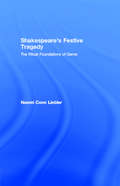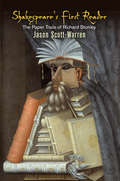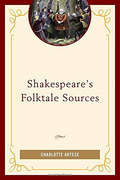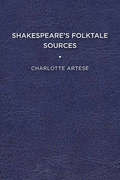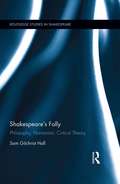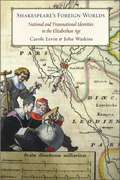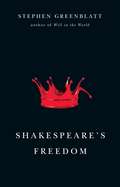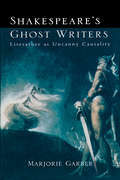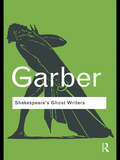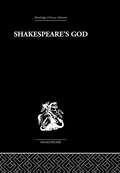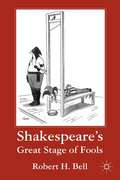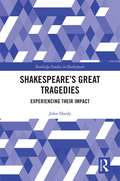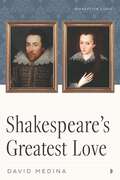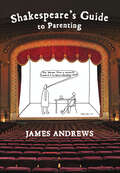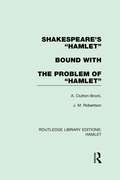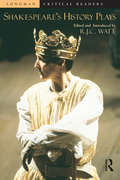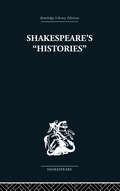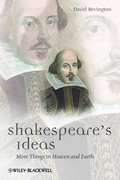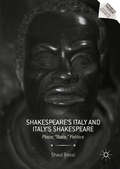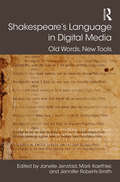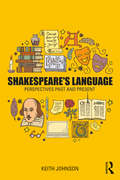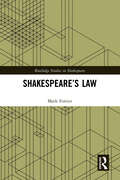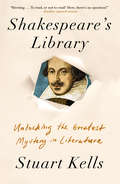- Table View
- List View
Shakespeare's Festive Tragedy: The Ritual Foundations of Genre
by Naomi Conn LieblerShakespeare's Festive Tragedy is a unique look at the social and religious foundations of the tragic genre. Naomi Liebler asks whether it is possible to regard tragic heroes such as Coriolanus and King Lear as `sacrifical victims of the prevailing social order'. A fascinating examination of Shakespearean tragedy, this extraordinary book will provoke excitment and controversy alike.
Shakespeare's First Reader: The Paper Trails of Richard Stonley (Material Texts)
by Jason Scott-WarrenRichard Stonley has all but vanished from history, but to his contemporaries he would have been an enviable figure. A clerk of the Exchequer for more than four decades under Mary Tudor and Elizabeth I, he rose from obscure origins to a life of opulence; his job, a secure bureaucratic post with a guaranteed income, was the kind of which many men dreamed. Vast sums of money passed through his hands, some of which he used to engage in moneylending and land speculation. He also bought books, lots of them, amassing one of the largest libraries in early modern London.In 1597, all of this was brought to a halt when Stonley, aged around seventy-seven, was incarcerated in the Fleet Prison, convicted of embezzling the spectacular sum of £13,000 from the Exchequer. His property was sold off, and an inventory was made of his house on Aldersgate Street. This provides our most detailed guide to his lost library. By chance, we also have three handwritten volumes of accounts, in which he earlier itemized his spending on food, clothing, travel, and books. It is here that we learn that on June 12, 1593, he bought "the Venus & Adhonay per Shakspere"—the earliest known record of a purchase of Shakespeare's first publication.In Shakespeare's First Reader, Jason Scott-Warren sets Stonley's journals and inventories of goods alongside a wealth of archival evidence to put his life and library back together again. He shows how Stonley's books were integral to the material worlds he inhabited and the social networks he formed with communities of merchants, printers, recusants, and spies. Through a combination of book history and biography, Shakespeare's First Reader provides a compelling "bio-bibliography"—the story of how one early modern gentleman lived in and through his library.
Shakespeare's Folktale Sources
by Charlotte ArteseShakespeare’s Folktale Sources argues that seven plays—The Taming of the Shrew, Titus Andronicus, The Merry Wives of Windsor, The Merchant of Venice, All’s Well that Ends Well, Measure for Measure, and Cymbeline—derive one or more of their plots directly from folktales. In most cases, scholars have accepted one literary version of the folktale as a source. Recognizing that the same story has circulated orally and occurs in other medieval and early modern written versions allows for new readings of the plays. By acknowledging that a play’s source story circulated in multiple forms, we can see how the playwright was engaging his audience on common ground, retelling a story that may have been familiar to many of them, even the illiterate. We can also view the folktale play as a Shakespearean genre, defined by source as the chronicle histories are, that spans and traces the course of Shakespeare’s career. The fact that Shakespeare reworked folktales so frequently also changes the way we see the history of the literary folk- or fairy-tale, which is usually thought to bypass England and move from Italian novella collections to eighteenth-century French salons. Each chapter concludes with a bibliography listing versions of each folktale source as a resource for further research and teaching. Published by University of Delaware Press. Distributed worldwide by Rutgers University Press.
Shakespeare's Folktale Sources
by Charlotte ArteseShakespeare’s Folktale Sources argues that seven plays—The Taming of the Shrew, Titus Andronicus, The Merry Wives of Windsor, The Merchant of Venice, All’s Well that Ends Well, Measure for Measure, and Cymbeline—derive one or more of their plots directly from folktales. In most cases, scholars have accepted one literary version of the folktale as a source. Recognizing that the same story has circulated orally and occurs in other medieval and early modern written versions allows for new readings of the plays. By acknowledging that a play’s source story circulated in multiple forms, we can see how the playwright was engaging his audience on common ground, retelling a story that may have been familiar to many of them, even the illiterate. We can also view the folktale play as a Shakespearean genre, defined by source as the chronicle histories are, that spans and traces the course of Shakespeare’s career. The fact that Shakespeare reworked folktales so frequently also changes the way we see the history of the literary folk- or fairy-tale, which is usually thought to bypass England and move from Italian novella collections to eighteenth-century French salons. Each chapter concludes with a bibliography listing versions of each folktale source as a resource for further research and teaching. Published by University of Delaware Press. Distributed worldwide by Rutgers University Press.
Shakespeare's Folly: Philosophy, Humanism, Critical Theory (Routledge Studies in Shakespeare)
by Sam HallThis study contends that folly is of fundamental importance to the implicit philosophical vision of Shakespeare’s drama. The discourse of folly’s wordplay, jubilant ironies, and vertiginous paradoxes furnish Shakespeare with a way of understanding that lays bare the hypocrisies and absurdities of the serious world. Like Erasmus, More, and Montaigne before him, Shakespeare employs folly as a mode of understanding that does not arrogantly insist upon the veracity of its own claims – a fool’s truth, after all, is spoken by a fool. Yet, as this study demonstrates, Shakespearean folly is not the sole preserve of professional jesters and garrulous clowns, for it is also apparent on a thematic, conceptual, and formal level in virtually all of his plays. Examining canonical histories, comedies, and tragedies, this study is the first to either contextualize Shakespearean folly within European humanist thought, or to argue that Shakespeare’s philosophy of folly is part of a subterranean strand of Western philosophy, which itself reflects upon the folly of the wise. This strand runs from the philosopher-fool Socrates through to Montaigne and on to Nietzsche, but finds its most sustained expression in the Critical Theory of the mid to late twentieth-century, when the self-destructive potential latent in rationality became an historical reality. This book makes a substantial contribution to the fields of Shakespeare, Renaissance humanism, Critical Theory, and Literature and Philosophy. It illustrates, moreover, how rediscovering the philosophical potential of folly may enable us to resist the growing dominance of instrumental thought in the cultural sphere.
Shakespeare's Foreign Worlds: National and Transnational Identities in the Elizabethan Age
by Carole Levin John WatkinsIn Shakespeare's Foreign Worlds, Carole Levin and John Watkins focus on the relationship between the London-based professional theater preeminently associated with William Shakespeare and an unprecedented European experience of geographic, social, and intellectual mobility. Shakespeare's plays bear the marks of exile and exploration, rural depopulation, urban expansion, and shifting mercantile and diplomatic configurations. He fills his plays with characters testing the limits of personal identity: foreigners, usurpers, outcasts, outlaws, scolds, shrews, witches, mercenaries, and cross-dressers. Through parallel discussions of Henry VI, The Taming of the Shrew, and The Merchant of Venice, Levin and Watkins argue that Shakespeare's centrality to English national consciousness is inseparable from his creation of the foreign as a category asserting dangerous affinities between England's internal minorities and its competitors within an increasingly fraught European mercantile system. As a women's historian, Levin is particularly interested in Shakespeare's responses to marginalized sectors of English society. As a scholar of English, Italian Studies, and Medieval Studies, Watkins situates Shakespeare in the context of broadly European historical movements. Together Levin and Watkins narrate the emergence of the foreign as portable category that might be applied both to "strangers" from other countries and to native-born English men and women, such as religious dissidents, who resisted conformity to an increasingly narrow sense of English identity. Shakespeare's Foreign Worlds will appeal to historians, literary scholars, theater specialists, and anyone interested in Shakespeare and the Elizabethan Age.
Shakespeare's Freedom
by Stephen GreenblattShakespeare lived in a world of absolutes—of claims for the absolute authority of scripture, monarch, and God, and the authority of fathers over wives and children, the old over the young, and the gentle over the baseborn. With the elegance and verve for which he is well known, Stephen Greenblatt, author of the best-selling Will in the World, shows that Shakespeare was strikingly averse to such absolutes and constantly probed the possibility of freedom from them. Again and again, Shakespeare confounds the designs and pretensions of kings, generals, and churchmen. His aversion to absolutes even leads him to probe the exalted and seemingly limitless passions of his lovers. Greenblatt explores this rich theme by addressing four of Shakespeare’s preoccupations across all the genres in which he worked. He first considers the idea of beauty in Shakespeare’s works, specifically his challenge to the cult of featureless perfection and his interest in distinguishing marks. He then turns to Shakespeare’s interest in murderous hatred, most famously embodied in Shylock but seen also in the character Bernardine in Measure for Measure. Next Greenblatt considers the idea of Shakespearean authority—that is, Shakespeare’s deep sense of the ethical ambiguity of power, including his own. Ultimately, Greenblatt takes up Shakespearean autonomy, in particular the freedom of artists, guided by distinctive forms of perception, to live by their own laws and to claim that their creations are singularly unconstrained. A book that could only have been written by Stephen Greenblatt, Shakespeare’s Freedom is a wholly original and eloquent meditation by the most acclaimed and influential Shakespearean of our time.
Shakespeare's Freedom (Campbell Lectures)
by Stephen GreenblattShakespeare lived in a world of absolutes—of claims for the absolute authority of scripture, monarch, and God, and the authority of fathers over wives and children, the old over the young, and the gentle over the baseborn. With the elegance and verve for which he is well known, Stephen Greenblatt, author of the best-selling Will in the World, shows that Shakespeare was strikingly averse to such absolutes and constantly probed the possibility of freedom from them. Again and again, Shakespeare confounds the designs and pretensions of kings, generals, and churchmen. His aversion to absolutes even leads him to probe the exalted and seemingly limitless passions of his lovers. Greenblatt explores this rich theme by addressing four of Shakespeare’s preoccupations across all the genres in which he worked. He first considers the idea of beauty in Shakespeare’s works, specifically his challenge to the cult of featureless perfection and his interest in distinguishing marks. He then turns to Shakespeare’s interest in murderous hatred, most famously embodied in Shylock but seen also in the character Bernardine in Measure for Measure. Next Greenblatt considers the idea of Shakespearean authority—that is, Shakespeare’s deep sense of the ethical ambiguity of power, including his own. Ultimately, Greenblatt takes up Shakespearean autonomy, in particular the freedom of artists, guided by distinctive forms of perception, to live by their own laws and to claim that their creations are singularly unconstrained. A book that could only have been written by Stephen Greenblatt, Shakespeare’s Freedom is a wholly original and eloquent meditation by the most acclaimed and influential Shakespearean of our time.
Shakespeare's Ghost Writers: Literature As Uncanny Causality (Routledge Classics Ser.)
by Marjorie GarberThe plays of Shakespeare are filled with ghosts - and ghost writing. Shakespeare's Ghost Writers is an examination of the authorship controversy surrounding Shakespeare: the claim made repeatedly that the plays were ghost written. Ghosts take the form of absences, erasures, even forgeries and signatures - metaphors extended to include Shakespeare himself and his haunting of us, and in particular theorists such Derrida, Marx, Nietzsche, and Freud - the figure of Shakespeare constantly made and remade by contemporary culture. Marjorie Garber, one of the most eminent Shakespearean theorists writing today, asks what is at stake in the imputation that "Shakespeare" did not write the plays, and shows that the plays themselves both thematize and theorize that controversy. This Routledge Classics edition contains a new preface and new chapter by the author.
Shakespeare's Ghost Writers: Literature as Uncanny Causality
by Marjorie GarberThe plays of Shakespeare are filled with ghosts – and ghost writing. Shakespeare's Ghost Writers is an examination of the authorship controversy surrounding Shakespeare: the claim made repeatedly that the plays were ghost written. Ghosts take the form of absences, erasures, even forgeries and signatures – metaphors extended to include Shakespeare himself and his haunting of us, and in particular theorists such Derrida, Marx, Nietzsche, and Freud – the figure of Shakespeare constantly made and remade by contemporary culture. Marjorie Garber, one of the most eminent Shakespearean theorists writing today, asks what is at stake in the imputation that "Shakespeare" did not write the plays, and shows that the plays themselves both thematize and theorize that controversy. This Routledge Classics edition contains a new preface and new chapter by the author.
Shakespeare's God: The Role of Religion in the Tragedies
by Ivor MorrisFirst published in 1972. Shakespeare's God investigates whether a religious interpretation of Shakespeare's tragedies is possible. The study places Christianity's commentary on the human condition side by side with what tragedy reveals about it. This pattern is identified using the writings of Christian thinkers from Augustine to the present day. The pattern in the chief phenomena of literary tragedy is also traced
Shakespeare's Great Stage of Fools
by Robert H. BellThis lively, lucid book undertakes a detailed and provocative study of Shakespeare's fascination with clowns, fools, and fooling. Through close reading of plays over the whole course of Shakespeare's theatrical career, Bell highlights the fun, wit, insights, and mysteries of some of Shakespeare's most vibrant and often vexing figures.
Shakespeare's Great Tragedies: Experiencing Their Impact (Routledge Studies in Shakespeare)
by John HardyShakespeare's great tragedies portray through their richly imagined worlds the inescapable fact of human mortality. As the work of a great creative genius, they are so diverse that critical formulas used to describe their overall impact tend to be somewhat suspect. Their impact follows from a response to the entire dramatic action, what is felt at the end with the weight or experience of the whole play behind it. It draws on how our feelings and judgement are exercised and engaged throughout the drama. Shakespeare portrays what life can be like, without pandering to the wish for something easier to contemplate. Something more invigorating than consolation is provided, such art at its greatest achieving the strength of truth. What it compels is a complex acceptance, reflected in Edgar's words, "The weight of this sad time we must obey". Not only implicit positives give value to these plays. Their significance finally results from what they imaginatively invite their audience to experience and witness. This gives a sense not only of the value of life, but also of what can threaten it.
Shakespeare's Greatest Love (Disruption Curios)
by David MedinaRelying on historical and literary evidence hidden in plain sight, Shakespeare's Greatest Love tells the true, uncensored love story of William Shakespeare and Henry Wriothesley, 3rd Earl of Southampton."Shall I compare thee to a summer's day? Thou art more lovely and more temperate." —Shakespeare's Sonnet 18, written for and about Southampton. Leaving behind a wife and three young children in Stratford-upon-Avon, Shakespeare moved to London for its thrilling theater scene, where everyone mixed freely across ages, classes, and ranks. It was through their mutual passion for the theater that the handsome twenty-seven-year-old playwright first met and fell deeply in love with the effeminate seventeen-year-old earl who beguiled men and women alike and avowed that 'desire and pleasure [should] sometimes triumph over reason.' Author David Medina demonstrates that Shakespeare wrote more of his plays and poems for and about Southampton than anyone else—works that are sexually charged, romantic, and homoerotic. He also chronicles the evidence that Southampton provided Shakespeare the support he needed to secure his acting company share, coat of arms, family residence, royal commission, life portrait, and funerary bust. Shakespeare and Southampton's personal and professional relationship evolved privately and publicly over a quarter century against the backdrop of a national anti-sodomy law, multiple plague outbreaks, unexpected pregnancies, rushed and possibly forced marriages, a failed rebellion, and political imprisonments. Shakespeare's Greatest Love challenges us all to recognize Southampton as the individual who had the most significant impact on Shakespeare's life, literature, and legacy.
Shakespeare's Guide to Parenting
by James AndrewsTrust father of three William Shakespeare for all the advice you need for any parenting dilemma, in this witty and erudite guide—a handy collection of wisdom drawn from his most beloved works, from Hamlet to King Lear to Much Ado About Nothing.With a series of cunningly extracted lines from his best-loved plays and sonnets, hilariously illustrated in a simple, almost child-like style, James Andrews proves once again that Shakespeare—expert on love, death, vanity, ambition, war, deceit, regret—is the font of all wisdom, including raising children.Your thirsty toddler wakes you up at 3 a.m. Shakespeare describes your thoughts perfectly:What cursed foot wanders this way tonight? (Romeo and Juliet)Your child throws a temper tantrum, clinging to your legs. Shakespeare has the perfect response:Vile thing, let loose, or I will shake thee from me like a serpent. (A Midsummer Night’s Dream)Your son throws a booze party, crashes the car, or commits some other vaguely humiliating infraction or minor illegal act. Shakespeare feels your pain:Good wombs have borne bad sons. (The Tempest)And for your fussy, ungrateful eater? Shakespeare has an answer:I’ll make you feed on berries and on roots, and feed on curds and whey, and suck the goat! (Titus Andronicus)Organized by periods of parenting hell—from the newborn nightmares to the teenage trials—Shakespeare’s Guide to Parenting is the perfect gift book for every literary parent or parent to be. If you want the last word with your children, nothing beats a quote from Shakespeare.
Shakespeare's Hamlet bound with The Problem of Hamlet (Routledge Library Editions: Hamlet)
by A. Clutton-Brock J. M. RobertsonThis volume combines two classic works on Hamlet, first published in 1919 and 1922. The first book's original description says that it contains a theory which attempts to explain an everlasting problem - it insists that Hamlet is neither a failure not an accident, but a very great work of art. In a final chapter, the play is examined as an aesthetic document. It is a profoundly interesting and not unprovocative work. The second book reviews and attempts to resolve the most interesting debate of any Shakespeare play and presents proper method for investigating the genesis of the plays in this way.
Shakespeare's History Plays (Longman Critical Readers)
by Robert WattShakespeare's history plays are central to his dramatic achievement. In recent years they have become more widely studied than ever, stimulating intensely contested interpretations, due to their relevance to central contemporary issues such as English, national identities and gender roles. Interpretations of the history plays have been transformed since the 1980s by new theoretically-informed critical approaches. Movements such as New Historicism and cultural materialism, as well as psychoanalytical and post-colonial approaches, have swept away the humanist consensus of the mid-twentieth century with its largely conservative view of the plays. The last decade has seen an emergence of feminist and gender-based readings of plays which were once thought overwhelmingly masculine in their concerns. This book provides an up-to-date critical anthology representing the best work from each of the modern theoretical perspectives. The introduction outlines the changing debate in an area which is now one of the liveliest in Shakespearean criticism.
Shakespeare's History: Mirrors of Elizabethan Policy.
by Lily B CampbellFirst published in 1947 in the USA. This edition reprints the first UK edition of 1964. Published to critical acclaim, the central argument of this book is that the historical play must be studied as a genre separate from tragedy and comedy. Just as there is in Shakespearean tragedies a dominant ethical pattern of passion opposed to reason, so there is in the history plays a dominant political pattern characteristic of the political philosophy of the age. From the 'troublesome reign' of King John to the 'tragical doings' of Richard III, Shakespeare wove the events of English history into plots of universal interest.
Shakespeare's Ideas: More Things in Heaven and Earth (Blackwell Great Minds #36)
by David BevingtonAn in-depth exploration, through his plays and poems, of the philosophy of Shakespeare as a great poet, a great dramatist and a "great mind". Written by a leading Shakespearean scholar Discusses an array of topics, including sex and gender, politics and political theory, writing and acting, religious controversy and issues of faith, skepticism and misanthropy, and closure Explores Shakespeare as a great poet, a great dramatist and a "great mind"
Shakespeare's Individualism
by Peter HolbrookProviding a provocative and original perspective on Shakespeare, Peter Holbrook argues that Shakespeare is an author friendly to such essentially modern and unruly notions as individuality, freedom, self-realization and authenticity. These expressive values vivify Shakespeare's own writing; they also form a continuous, and a central, part of the Shakespearean tradition. Engaging with the theme of the individual will in specific plays and poems, and examining a range of libertarian-minded scholarly and literary responses to Shakespeare over time, Shakespeare's Individualism advances the proposition that one of the key reasons for reading Shakespeare today is his commitment to individual liberty - even as we recognize that freedom is not just an indispensable ideal but also, potentially, a dangerous one. Engagingly written and jargon free, this book demonstrates that Shakespeare has important things to say about fundamental issues of human existence.
Shakespeare's Italy and Italy's Shakespeare
by Shaul BassiShaul Bassi is AssociateProfessor of English and Postcolonial Literature at Ca'Foscari University ofVenice, Italy. His publications include Visionsof Venice in Shakespeare, with Laura Tosi, and Experiences of Freedom in Postcolonial Literatures and Cultures, with Annalisa Oboe.
Shakespeare's Language in Digital Media: Old Words, New Tools (Digital Research in the Arts and Humanities)
by Janelle Jenstad Mark Kaethler Jennifer Roberts-SmithThe authors of this book ask how digital research tools are changing the ways in which practicing editors historicize Shakespeare's language. Scholars now encounter, interpret, and disseminate Shakespeare's language through an increasing variety of digital resources, including online editions such as the Internet Shakespeare Editions (ISE), searchable lexical corpora such as the Early English Books Online-Text Creation Partnership (EEBO-TCP) or the Lexicons of Early Modern English (LEME) collections, high-quality digital facsimiles such as the Folger Shakespeare Library's Digital Image Collection, text visualization tools such as Voyant, apps for reading and editing on mobile devices, and more. What new insights do these tools offer about the ways Shakespeare's words made meaning in their own time? What kinds of historical or historicizing arguments can digital editions make about Shakespeare's language? A growing body of work in the digital humanities allows textual critics to explore new approaches to editing in digital environments, and enables language historians to ask and answer new questions about Shakespeare's words. The authors in this unique book explicitly bring together the two fields of textual criticism and language history in an exploration of the ways in which new tools are expanding our understanding of Early Modern English.
Shakespeare's Language: Perspectives Past and Present
by Keith JohnsonIn Shakespeare’s Language, Keith Johnson offers an overview of the rich and dynamic history of the reception and study of Shakespeare’s language from his death right up to the present. Tracing a chronological history of Shakespeare’s language, Keith Johnson also picks up on classic and contemporary themes, such as: lexical and digital studies original pronunciation rhetoric grammar. The historical approach provides a comprehensive overview, plotting the attitudes towards Shakespeare’s language, as well as a history of its study. This approach reveals how different cultural and literary trends have moulded these attitudes and reflects changing linguistic climates; the book also includes a chapter that looks to the future. Shakespeare’s Language is therefore not only an essential guide to the language of Shakespeare, but it offers crucial insights to broader approaches to language as a whole.
Shakespeare's Law (Routledge Studies in Shakespeare)
by Mark FortierShakespeare's Law is a critical overview of law and legal issues within the life, career, and works of William Shakespeare as well as those that arise from the endless array of activities that happen today in the name of Shakespeare. Mark Fortier argues that Shakespeare’s attitudes to law are complex and not always sanguine, that there exists a deep and perhaps ultimate move beyond law very different from what a lawyer or legal scholar might recognize. Fortier looks in detail at the legal issues most prominent across Shakespeare’s work: status, inheritance, fraud, property, contract, tort (especially slander), evidence, crime, political authority, trials, and the relative value of law and justice. He also includes two detailed case studies, of The Merchant of Venice and Measure for Measure, as well as a chapter looking at law in works by Shakespeare's contemporaries. The book concludes with a chapter on the law as it relates to Shakespeare today. The book shows that the legal issues in Shakespeare are often relevant to issues we face now, and the exploration of law in Shakespeare is as germane today, though in sometimes new ways, as in the past.
Shakespeare's Library: Unlocking the Greatest Mystery in Literature
by Stuart KellsA tantalizing true story of one of literature’s most enduring enigmas is at the heart of this “lively, even sprightly book” (Michael Dirda, The Washington Post)—the quest to find the personal library of the world’s greatest writer.Millions of words of scholarship have been expended on the world’s most famous author and his work. And yet a critical part of the puzzle, Shakespeare’s library, is a mystery. For four centuries people have searched for it: in mansions, palaces and libraries; in riverbeds, sheep pens and partridge coops; and in the corridors of the mind. Yet no trace of the bard’s manuscripts, books or letters has ever been found.The search for Shakespeare’s library is much more than a treasure hunt. Knowing what the Bard read informs our reading of his work, and it offers insight into the mythos of Shakespeare and the debate around authorship. The library’s fate has profound implications for literature, for national and cultural identity, and for the global Shakespeare industry. It bears on fundamental principles of art, identity, history, meaning and truth.Unfolding the search like the mystery story that it is, acclaimed author Stuart Kells follows the trail of the hunters, taking us through different conceptions of the library and of the man himself. Entertaining and enlightening, Shakespeare’s Library is a captivating exploration of one of literature’s most enduring enigmas."An engaging and provocative contribution to the unending world of Shakespeariana . . . An enchanting work that bibliophiles will savor and Shakespeare fans adore." ―Kirkus Reviews
